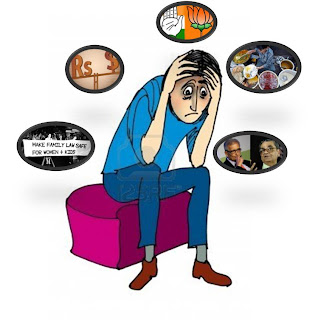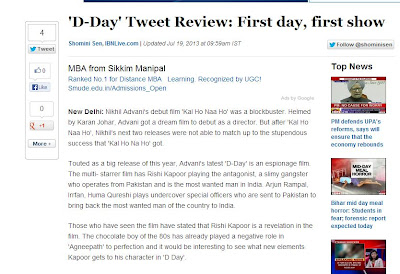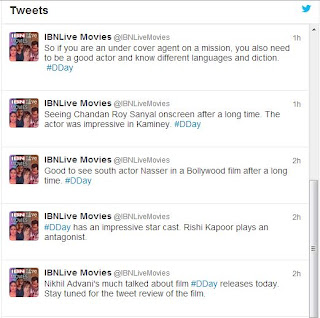Many of us watch MasterChef and for various reasons we love
the show. Perhaps this is one such series that even the vegetarians across
India watch. Ever wondered why? It is because more than the recipe, the
contestants share the innovations possible, the new ingredients, the excitement
of the time and many Management lessons.
No, we do not watch it for learning Management. Of course
not, but the show comes with handful of them (in the order of how the show
runs)-
1. Be prepared for new challenges – The contestants
are taken to different restaurants, different cities where the culture, people
and even food habits are new to them. They themselves belong to different places
and are surprised every day with a new goal to achieve. It depicts a
skill - accept whatever comes your way, go conquer the world.
2. Teamwork – Many fight, many throw different
ideas but it is their teamwork which results in sweet fruit in the end. Most of
the times, we have come across that if there is even slightest of politics or ambiguity
or even disagreement, your recipe is affected. I have this amazing quote from
my mother – Your mood at the time you are cooking, is directly proportional to
the taste and appearance of the meal.
3. Strategizing – The contestants are told the goal
of the day and then they have to think through each and every small activity
from the dish they would cook, to ingredients they would require, to budgets
they are allocated and how would they present. Small time is given but it has
to be goal driven. Planning & then executing is the key.
4. Eye for detail & Creativity – The dishes
they churn out is presented with details and an art. The way the contestants
pronounce the item is as close to what is visible on the plate. It is neat. They
take care of even the smallest of flavors which may cause a taste change in
the dish. From hygiene to quantity to the final product, everything is a piece of
their beautiful imagination. Very famous quote from Steve Jobs comes to my mind
‘Creativity is just connecting things. When you ask creative people how they
did something, they feel a little guilty because they didn't really do it, they
just saw something. It seemed obvious to them after a while. That's because
they were able to connect experiences they've had and synthesize new things’.
5. Crisis Management – What happens when the dish
turns out not the way he or she wanted? They have a backup plan. Or they fail
and present what is on the table. Again two important things to note down here
is always have a Plan B to fall upon. And if time is a constrain and you cannot
execute the Plan B, present what is completed with conviction. You never know
the task which you are not satisfied with, might interest somebody else. Even
if failure is on the back of your mind, go with what you have.
6. Performance under pressure – Time has always
been a constraint and not only for these contestants but even in our daily
tasks. Pressure of successful completion, wining in your duties, peer pressure
and tough competition will always be there in your job or business. But the way these chefs perform under all these limitations is a big learning for all of us.
7. Accepting criticism in positive manner – You thought
it was your best shot but something happened and hell broke loose on it? These
contestants go though it almost every time and one is eliminated on every show.
Yet they face it with patience. They take the feedback in positive manner. If
it was bad they take the judge’s fury and if it was good (at-least to them) but
was not up to the mark, they still listen. Resilience is the key.
There are many other small day to day incidences which life
teaches us from these shows such as budgeting, timing, prioritizing, presentation, servicing
the end consumer and customer satisfaction. It depends on us how
we tune ourselves after watching them.
Summary from the above Management Lessons in a Quote - ‘Life does throw lemon on
all of us; we have to be opportunistic to ask for tequila and salt!’








